
Each week, Next TV writers Daniel Frankel and David Bloom stop being polite with one another ... and get real.
DAVID BLOOM: Happy Memorial Weekend, D.F.! Hope you'll be relaxing from the rigors of your roles as editor/savior of Next TV and parent of a love-smitten teenager. Here on the holiday eve, the NCAA raised a gigantic white flag that will remake college athletics. Under settlement terms of the landmark House v. NCAA lawsuit, former Division 1 college athletes will get $2.75 billion in back pay, a modest portion of the billions that college sports generate for everyone else. Going forward, schools can set aside up to $20 million a year to pay their athletes, beyond whatever the school's name/image/likeness organizations are already forking over.
NCAA President Charlie Baker called the settlement "an important step in the continuing reform of college sports," but it's only a step. At least eight more major lawsuits seek to transform other NCAA operations. It's a new era. Any thoughts on what this means for college sports on TV, as rights prices keep escalating, women's basketball takes off, Warner Bros. Discovery subleases football playoffs, and the two biggest football programs in the ACC try to break out of their conference's onerous TV deal? As the late, insanely great George Michael (with an assist from supermodel Linda Evangelista) might have put it, Freedom!
DANIEL FRANKEL: It's just and fair, I suppose, but we're being a little disingenuous when we broadly say "college athletics." It's football and men's basketball at this point, and maybe women's basketball if those Caitlin Clark-era ratings hold. If you're lucky enough to get a D1 scholarship in say, baseball, you're probably still talking about a 1/3 of a scholarship. I counted 40 players on defending 2023 NCAA D1 Champion LSU's roster, but D1 teams are capped at 11.7 scholarships.
Also read: Unequal NIL Funding in Baseball Highlights College Sports Concerns
A few college baseball stars at big Division I schools get big NIL money, but you could probably count those on your hands and toes. And I'll bet less than 20 football schools -- Oregon and Phil Knight certainly among them -- are going to be able to pay their players $20 million worth of salaries. I suspect this will ultimately result in the creation of true pro football "minor league" operated by the schools, with schools unwilling to play that $20 million game returning to a more traditional posture. Speaking of college football, I share Charles Barkley's consternation about TNT getting into business with the College Football Playoff.
BLOOM: By the way, equity research firm MoffettNathanson issued a research note this week saying it's not clear the college football games will generate more money for WBD than the reported $25 million apiece that they cost, especially given startup costs. But the deal may be more about Venu than revenue, as WBD tries to maintain its already modest contribution to the proposed sports skinny bundle with Disney and Fox, analyst Robert Fishman wrote. TNT, TBS and all those Discovery networks also have "a decent number" of cable renewal negotiations coming in 2025. "Are two CFP first-round games through 2025 plus an additional two quarterfinal games starting in 2026 enough to move the needle in these negotiations?" Having the games might provide bargaining leverage if the NBA is indeed gone, baby, gone. That won't make Chuck's wine, or whine, taste any better going down.
FRANKEL: Again, it's like Netflix and its two NFL games a season -- how is TNT going to ramp up the production infrastructure, play-by-play, etc. for two games a year? And what about losing Morgan Spurlock at 53? That is a bummer. That dude was a true media business innovator. He figured out how to make old-school, Ralph Nader-esque consumer advocacy entertaining in a kind of wildly inventive way.
BLOOM: RIP to Morgan Spurlock, who died way too young after making a remarkable splash two decades ago with Super Size Me, his stomach-churning exploration of the deleterious effects of eating only McDonald's food for one month. It sparked an ongoing conversation about our national diet, and forced even mammoth Mickey D's to re-evaluate what it was serving the populace. In the 20 years since, Spurlock racked up a remarkable 69 credits as producer or executive producer on all kinds of films, series, and other projects. He'll be missed. Another true innovator, Charter CEO Chris Winfrey, continued to reshape the media industry again this week, when his company agreed not to completely devastate the shambling hulk of Paramount Global in their just-renewed carriage agreement. Paramount Plus and BET Plus ad-supported versions will be free to Charter cable subscribers, and no Par cable channel gets put on an ice floe, unlike what happened to eight Disney networks last fall.
Also read: Charter to Offer Pay TV Customers Paramount Plus at No Extra Charge with New Carriage Deal
We still don't know how much Charter will pay to carry the Paramount networks, a crucial detail. I'll also be fascinated to see the impact on Paramount Plus subscriber numbers, which you've extolled as they passed 71 million. Will Charter customers de-duplicate their payments for streaming and cable? Will it matter to Par's two would-be buyer groups, other than removing a massive uncertainty in their spreadsheets? Regardless, as MoffettNathanson's Robert Fishman wrote, the deal is "keeping the lights on" at Par, given how important cable and broadcast are to revenues.

Winfrey, unlike former Par CEO Bob Bakish or WBD Chief Executive Clown David Zaslav (Charles Barkley's words, not mine), also has a better case for the $89 million he was paid last year. The Wall Street Journal's annual compensation rankings for S&P 500 CEOs put Winfrey tops among media company leaders, and fourth overall. Zaslav, who like Winfrey answers to John Malone, was ninth ($50 million), and Bakish, who was pushed out, was 30th ($31.3 million). As Barrett Strong memorably put it 65 years ago, money, that's what I want.
FRANKEL: Speaking of Zaz -- and yes, we transition a lot of our discussions this way! -- I just saw that Warner Bros.' latest Mad Max movie, Furiosa: A Mad Max Story, is tracking to lead the worst Memorial Day box office since 1995 with only a $32 million opening. I saw the film on Friday. It was a decidedly average action movie, despite its 89% critics aggregation, particularly when compared to filmmaker George Miller's exotically charmed 2015 reboot masterpiece, Mad Max: Fury Road.
I would encourage anyone to read The New York Times' 2020 oral history of that fraught production, which pitted costars Charlize Theron and Tom Hardy against each other in the Namibian desert ... a tension that somehow methodically translated to onscreen alchemy. What's interesting is Miller's ability to transition from old-world circus-era filmmaking to a modern, safer, saner workplace paradigm ... with lawyers involved and rules ... and a lot more CGI. Miller's best work seems to have come when those two opposing workplace cultures clashed. Discussing Fury Road's lauded stunt work and practical effects in a 2017 interview, Steven Soderbergh wondered, "I don’t understand how hundreds of people aren’t dead.” These days, no major studio is going to turn a film director loose in the Southwest African desert and say, "Hey, take a lot of risks and work your magic!" And they're not going to put up with Tom Hardy rolling out of his trailer at 11 a.m. and bickering with his costar. But maybe art -- the kind we want to pay money to see -- requires a bit of chaos, the kind that can only happen when, say, a truly repentant actor like Hardy seeks "some kind of redemption," not only the one in the script, but in real life with cast and crew mates he has thoughtlessly managed to piss off in previous, long, hot, dry, dusty weeks of filming. His body language betrays all of it. It's unique, and we viewers pick up on it. Perhaps that lack of visceral "realness" in today's cinema is at least partly driving viewer dissonance?
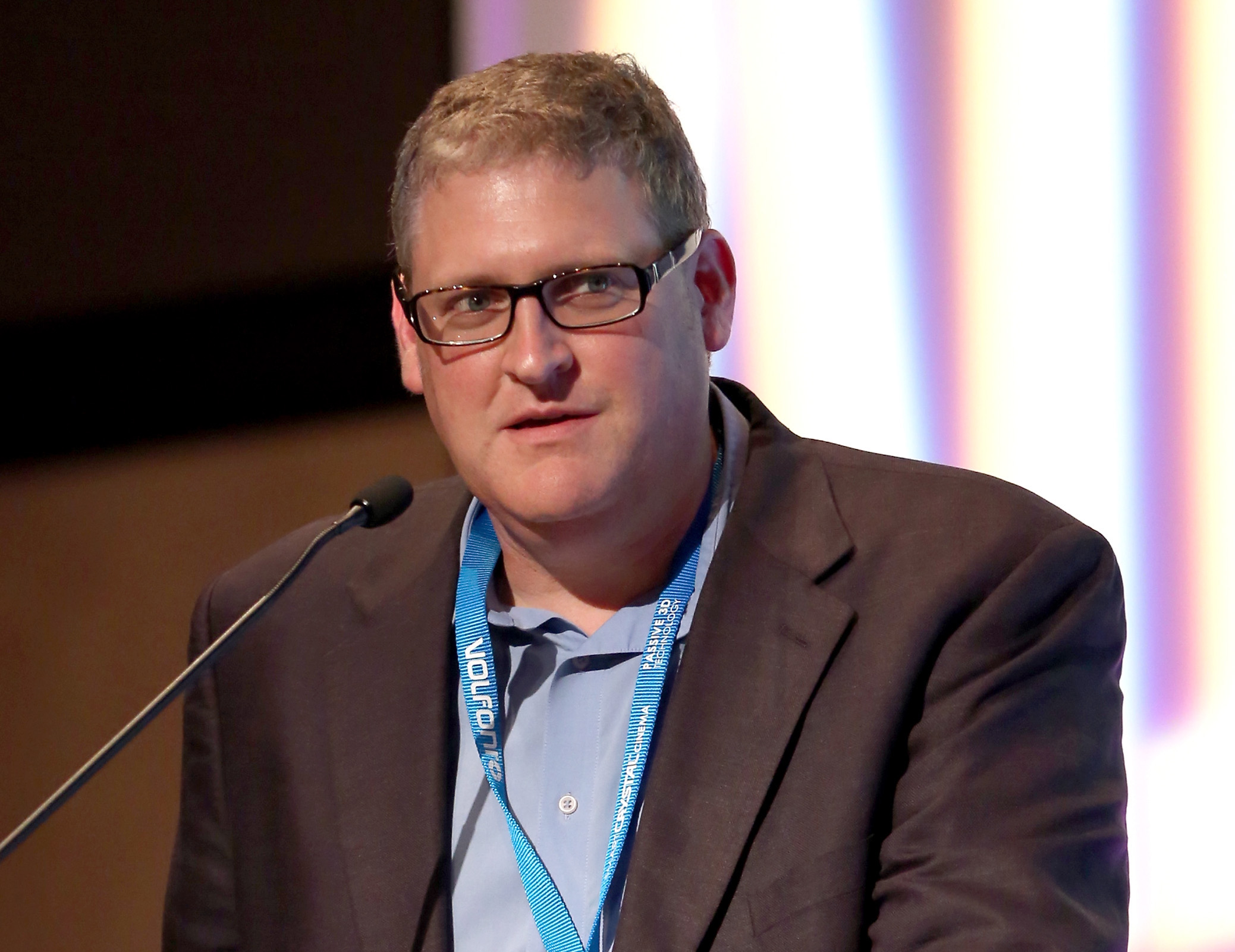
BLOOM: It would have been remarkable for even a master action director such as Miller to match the practical-effects-filled glories of Fury Road with, well, anything. It's one of the great action films and critical surprises of all time. Whatever movies are coming this year seem unlikely to light anyone's fire, hobbled by last year's strike impacts, rampant project cuts, and worsening sequelitis. Last year's domestic box office reached only $8.9 billion, 21% above 2022, but still 21% below 2019, the last good year before the pandemic blew everything up. This year is headed for a disastrous drop from 2023, "fueled" by a sorry collection of unexciting sequels set to stack up in substantially empty theaters. It's gotten so bad that NATO, the theater owners' trade group, no longer routinely publishes basic data on ticket sales and revenues. Go to their website, and you get this:
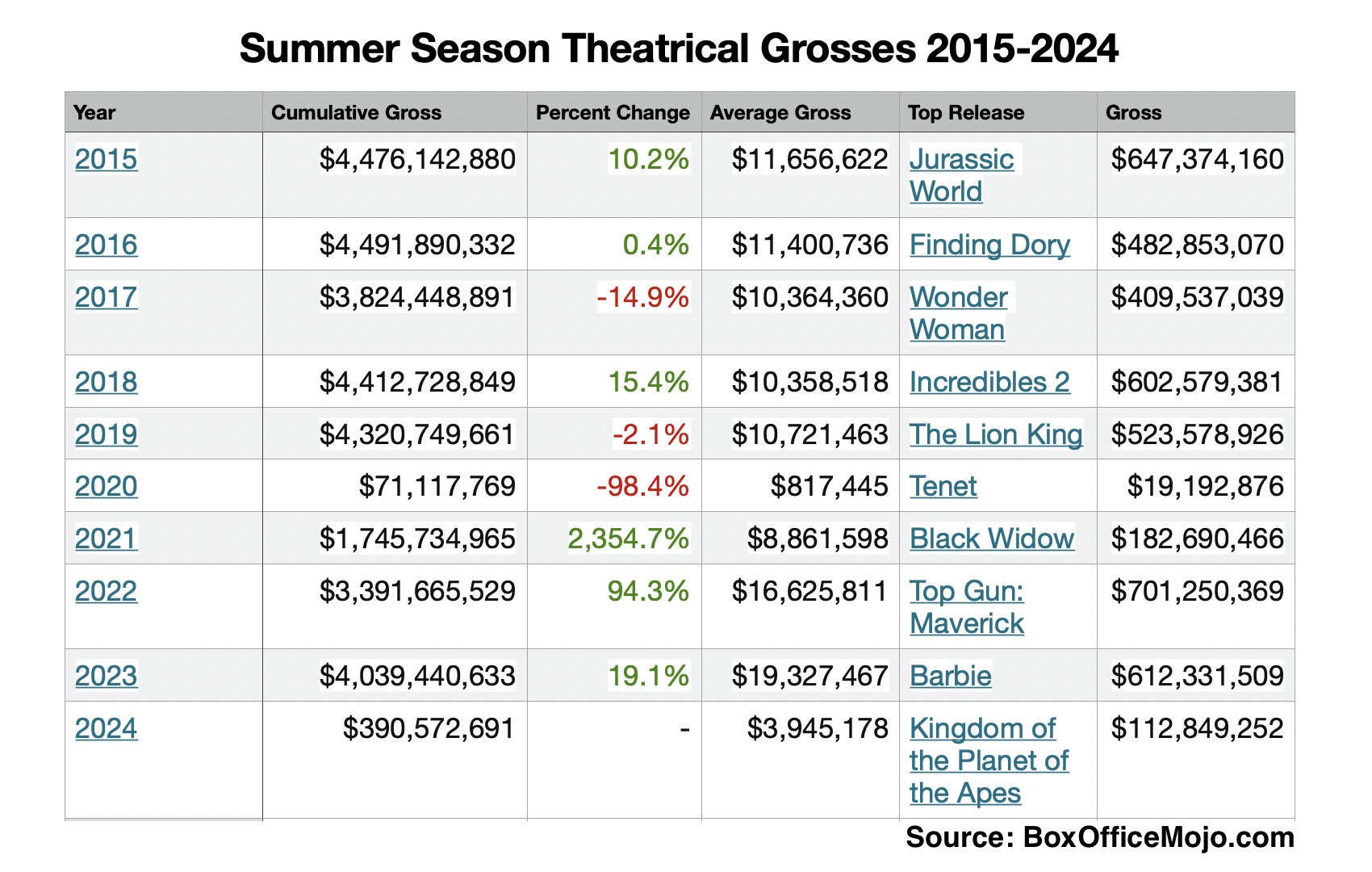
It's fitting that NATO's newly redesigned website features lots of red, matching the ink color on the books of many of its members. The stock market's latest round of meme-stock madness floated AMC Entertainment another life raft, but that's a short-term savior.
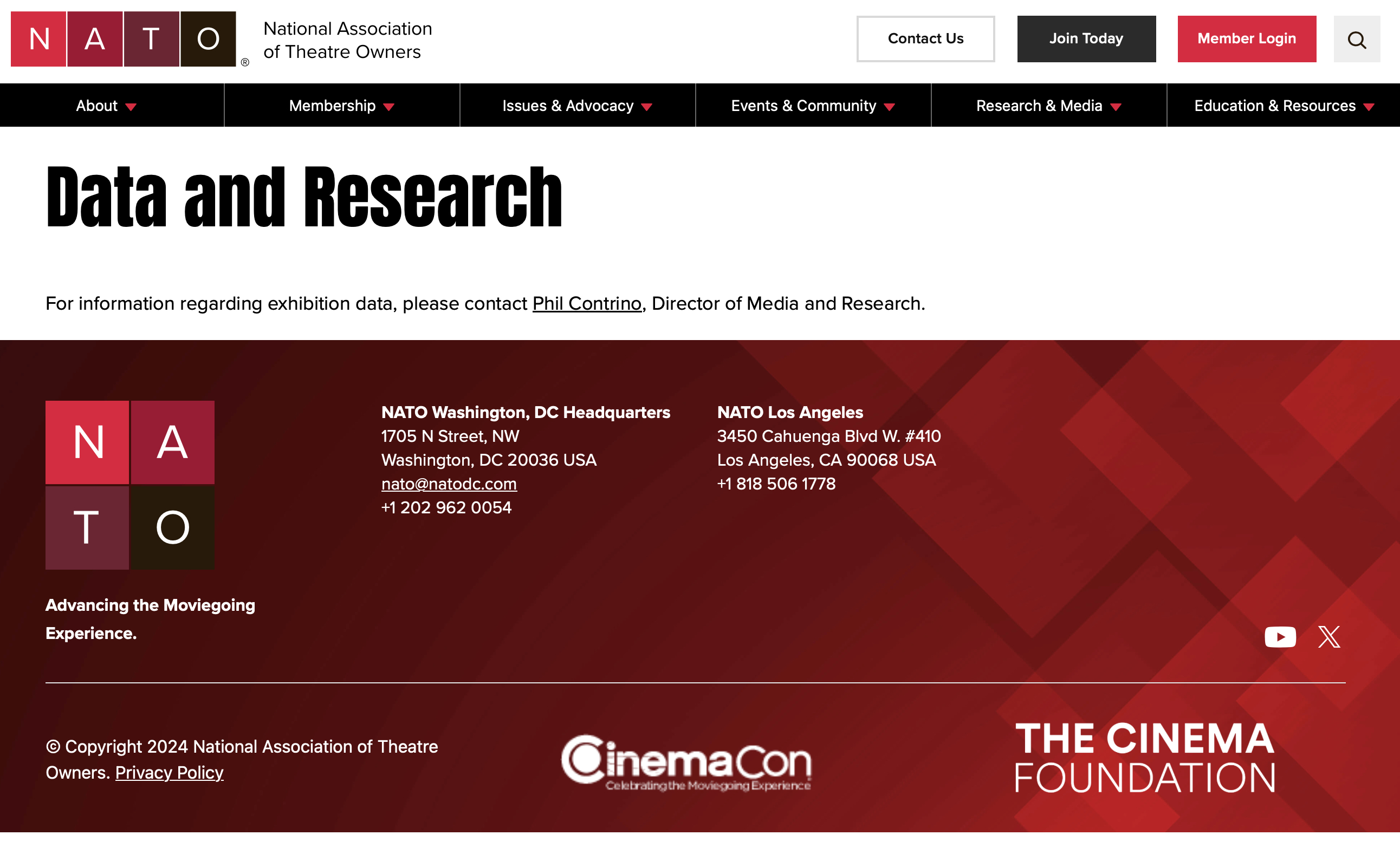
Taylor Swift (probably) won't release another exclusive tour movie this year, and even Apple seems less enamored of theatrical releases for its TV+ movies. I worked up a couple of graphics from BoxOfficeMojo.com, an Amazon-owned site that still publishes theatrical data. Summer and movie theaters used to go together like Busby and Berkeley. So far this summer season (defined by BOM as the first weekend in May to Labor Day), not so much. Box office grosses are about one-tenth of last summer's total, though we're nearly a quarter of the way in. The average gross per release is about one-fifth last year. And more than a quarter of this year's total has come from a single film, the fourth installment of the latest era of Planet of the Apes, which you saw and critics largely applauded. Worse, though, the $112.8 million that Apes 10 has pulled in since May 10 certainly won't cover either its costs or everything theaters need. There's a reason the industry's motto this year is "Survive Until 2025!" Somehow.
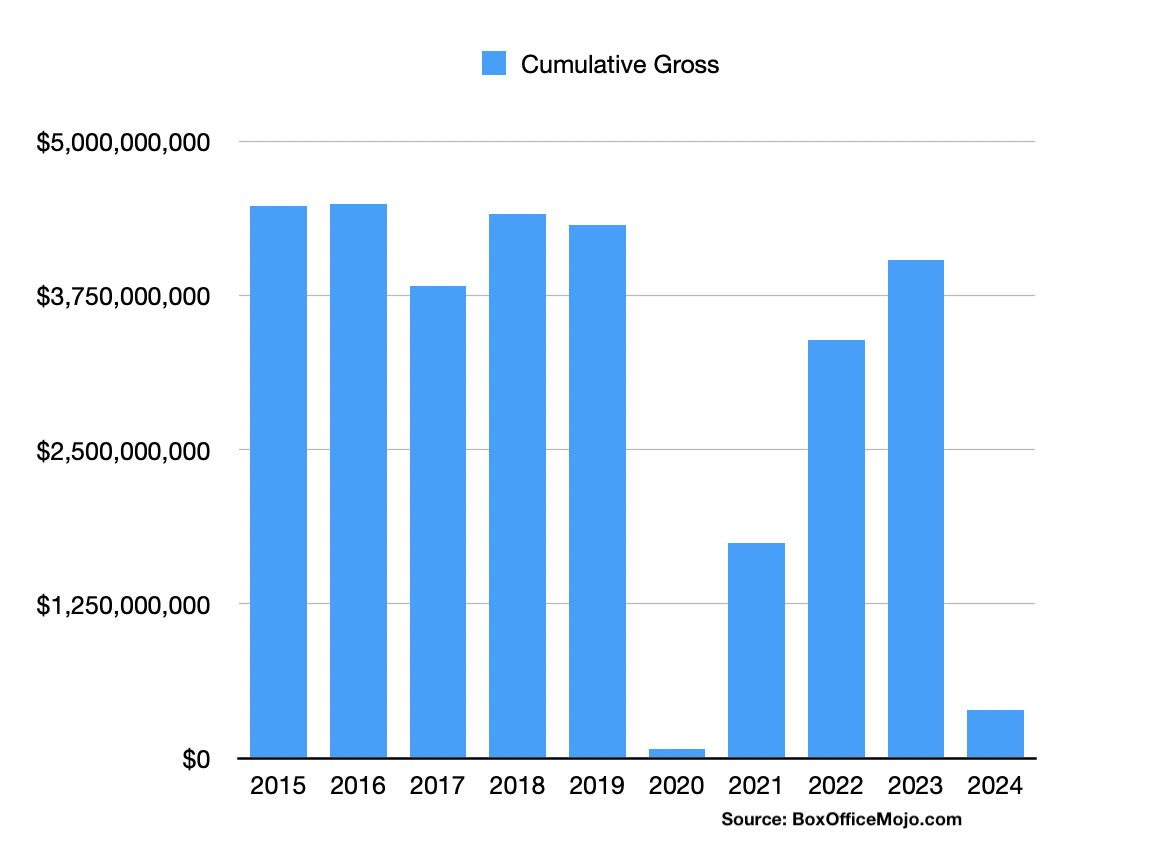
FRANKEL: Away -- but not too far away -- from that numerical discussion about the global movie business is the lost art of it all. All those extremist method men, who sounded so crazy, wasted so much money, pissed so many people off ... who demanded that the set be pushed to uncomfortable places, places where true art can only be made. Well, we have "no-asshole" rules everywhere now, and everyone's "comfort" is legal right. I'm not saying workplaces overridden by safety hazards and sexual harassment don't need to be regulated. But I think, at the same time, the fascination with Fury Road is it might be one of the last examples where it was done the old way ... with dangerous practical effects and stars who could be three hours late to work and still not get fired. But speaking of doing it the new way, Netflix released the second half of its big 2023 data download last week. What do you think we learned from that?
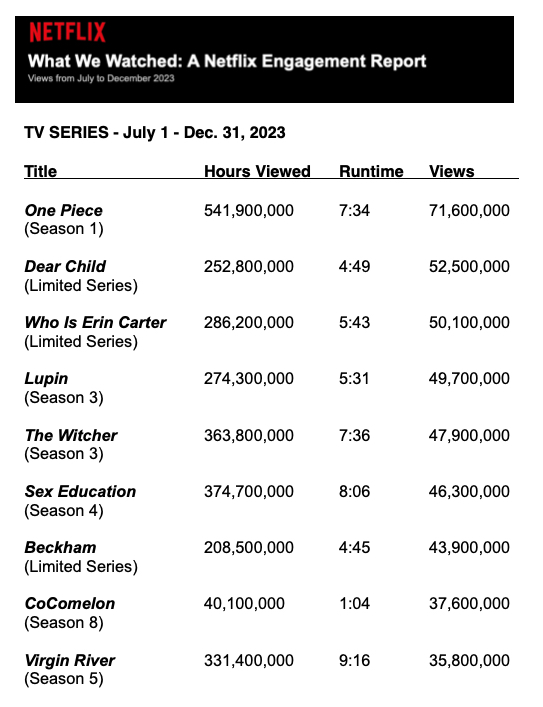
BLOOM: I didn't see many surprises in Netflix Mega Super Data Dump 2: The Sequel. You could guess most of the most-watched if you watched Netflix regularly. NMSDD2:TS does have other, far more interesting aspects though. One is how increased data transparency enables Netflix, like Disney and all their less successful competitors, to shift how they pay talent (and for what). Given your sweet pining for the old days of Screamin' George/Tom/Charlize, it should hearten you to hear that the big trend in pay packages (other than for fat-cat CEOs) is to tie payouts to actual success. Back in the old days, Netflix turned Hollywood upside down with huge upfront payments to name-brand creators, while buying out most or all backside/international bonuses if a show became a hit. Bye bye, lottery ticket. The upfront buyout makes sense when you're running a subscription business, because more viewing isn't unalloyed good news. It also means more costs without more revenue. As Netflix and nearly everyone else shift focus to their ad-supported tiers, their incentives shift, too. They make more money when people spend more time watching, just like Ye Old, Old Days! The creators should, in turn, profit more too, though a more thorough shift to ad-supported approaches also changes issues such as how you structure a show and write its dramatic ebbs and flows. Now you have to accommodate ad breaks again, just like Love American Style and The Love Boat had to do.
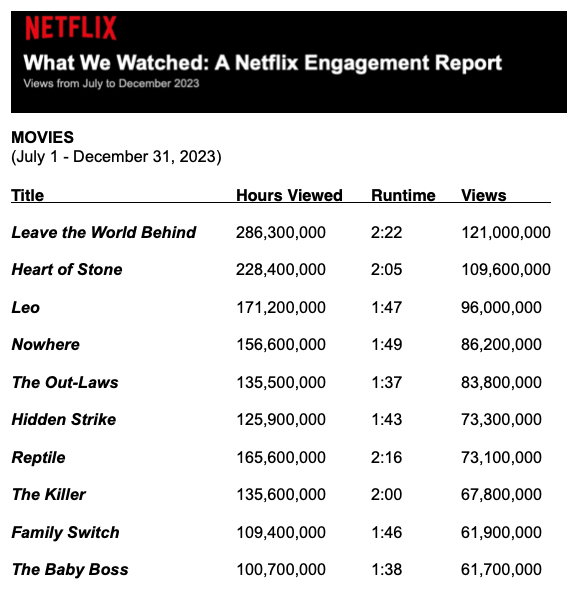
I'd also note Netflix is releasing more kinds of data: Now they include global availability, hours viewed, runtime, total views, and release date. About 1,600 (24%) of the 6,600 series had 100,000 or fewer views, and 300 (less than 5%) had 100,000 hours or less of view time. Netflix also showed 9,400 feature-length shows, 3,500 of which had no more than 100,000 views (about 2 in 7, or 37%). Being a series rather than a one-shot feature or special can still mean significant view time. For instance, As Aventuras de Poliana: Season 1 includes nearly seven hours of programming for those 100,000 views, translating to 33 million hours of view time. Like many bottom dwellers, Poliana wasn't distributed globally, and was an international show.
The bottom also includes plenty of U.S. shows, many of them licensed, such as Season 1 of reality show The Real Housewives of Beverly Hills or Season 9 of kids animated series The Fairly OddParents. Comedy specials, a long-time Netflix specialty, also populate the bottom reaches in surprising ways. Names such as Amy Schumer, Zach Galifianakis, Aziz Ansari, Bo Burnham, Ken Jeong, Kevin Hart, Marc Maron, Sarah Silverman, Chris D'Elia, Colin Quinn, Demetri Martin and Hannah Gadsby, among many other notable comics, attracted 100,000 or less hours of view time. Many are older shows, which accounts for some of this. And the flipside: these shows are dead cheap to produce, and generate live box office too, so they clearly pencil out for Netflix. But perhaps disclosing the modest view time numbers give Netflix more leverage in negotiating prices for these and other creators next show.
FRANKEL: You mention Aziz Ansari, and I flashed back to my days editing Variety's "10 Comics to Watch" annual special feature... back in the mid aughts, when Variety was still bankrolled by bloodless Western Europeans ... but, before the Saudi Arabian money rolled in. We ended up selecting Human Giant, the comedy group that included Ansari, Rob Huebel and Paul Scheer, among others, mainly because I couldn't stop laughing at this video ... that could in no way ever get made today:
On a more serious note, there's a segment of the market who will miss almost everything we're talking about because Republican House Speaker Mike Johnson refused to reinvigorate the Affordable Communications Program. The ACP provided a home broadband subsidy used by a lot of military families to offset the cost of what has become a basic necessity for Americans, the internet. It's providing partial funding now but will run out of money completely on Thursday. There is bi-partisan legislation on Johnson's desk that could refill the ACP's coffers and get it going again. Now, this program doesn't just help folks Christian GOP lawmakers like Johnson don't seem to care much about -- people without a lot of money. But it has also been propping up corporate broadband interests like Comcast and Charter, who are already operating in an ultra-competitive market for high-speed internet and say they expect to lose even more customers in the second and third quarters because the ACP is sunsetting.
Also read: Comcast’s Dave Watson: Focus Is on Revenue, Not Broadband Additions
BLOOM: The ACP is a great government program that also funded the cable providers to build into rural and other underserved areas that previously weren't economical to reach, bringing affordable high-speed internet connections to parts of the country that otherwise had been deserted for decades by the private sector. That aspect of the ACP makes me hopeful that it might find bipartisan support in Congress for an extension or even expansion, sooner than later.
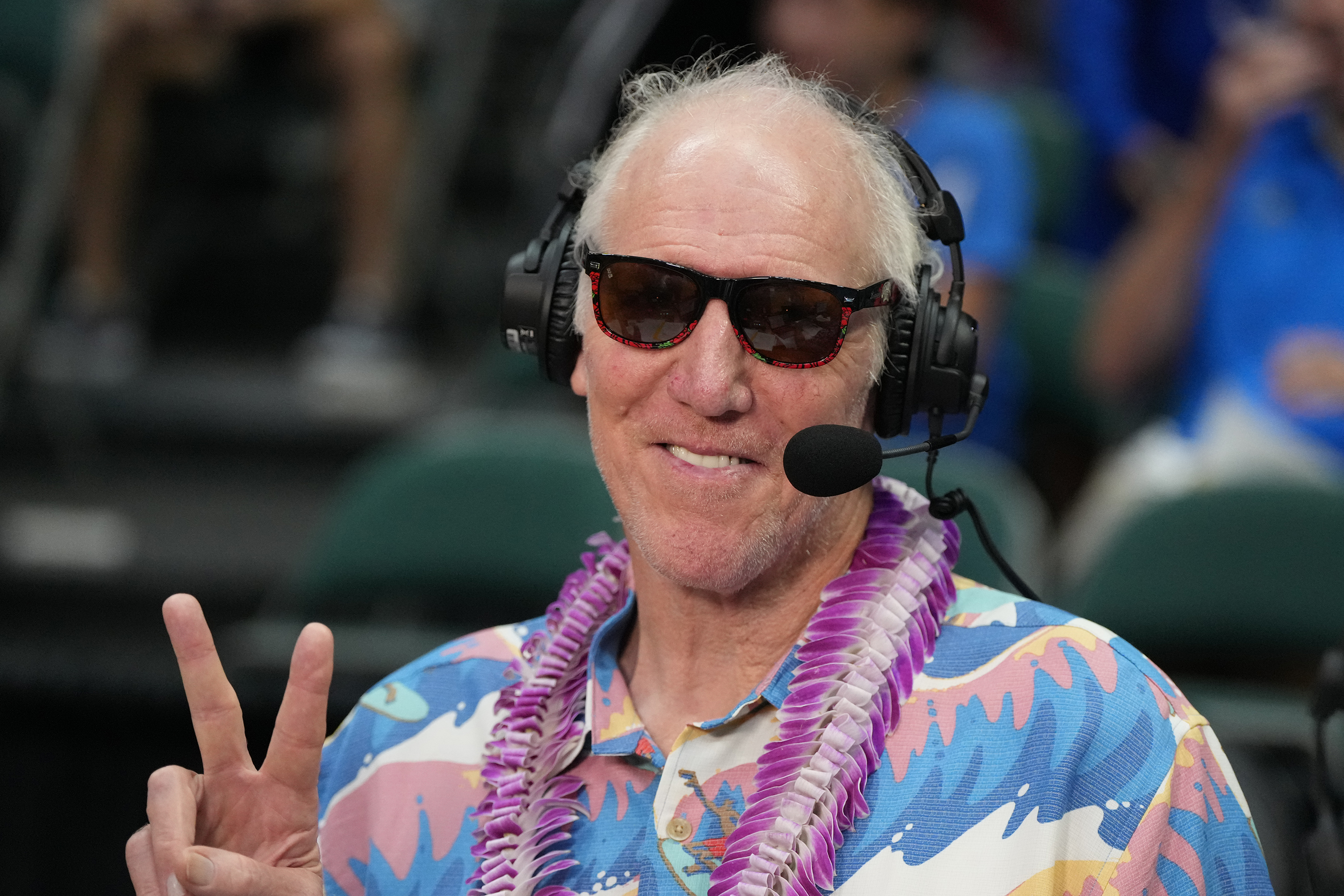
As I write, sad news comes that basketball Hall of Famer Bill Walton has died at 71. He was one of the two or three greatest college basketball players ever, winning three national player of the year awards, two national championships and a still-record 88 straight wins at UCLA.
Also read: Bill Walton, Legendary NBA Player and Broadcaster, Dead at 71
Walton's pro career was repeatedly marred by chronic foot and ankle injuries that nonetheless yielded a transcendent 1977 championship season with the Portland Trailblazers, and a late-career second title with the Boston Celtics. In the decades after his retirement, Walton proved to be a quirky (if not outright eccentric), wildly enthusiastic and deeply knowledgeable broadcaster focused on college basketball. It is perhaps fitting that Walton passed just days after the final broadcast of the Pac-12 Network, a doubleheader of women's softball. The network suffered collateral damage from the incompetence, hubris and failed leadership of the college athletics conference that owned it, but certainly the network's on-air voices, including Walton and Amy Adamson, deserved far better than the network's whimper of an end. Both the wonderful Walton and the consistently excellent network of champions will be missed.
FRANKEL: Bill Walton was a man who battled debilitating physical pain for decades, with an immobilizing back injury pushing him to the brink of suicide at one point. Those tough experiences seemed to hone him into a uniquely joyful, strong, effervescent man, who constantly reminded everyone within earshot how wonderful it was to be alive and watching basketball. For the legions of us who admired him, were touched by him and will miss him, this is a significant loss.







